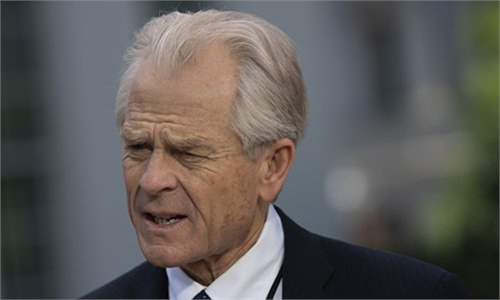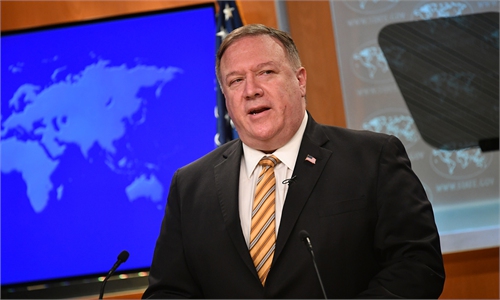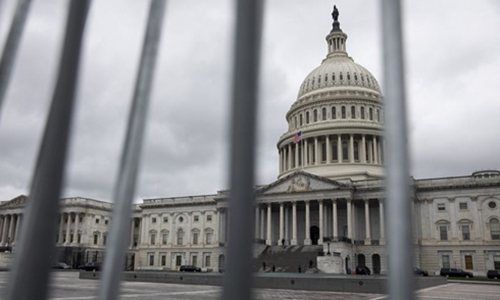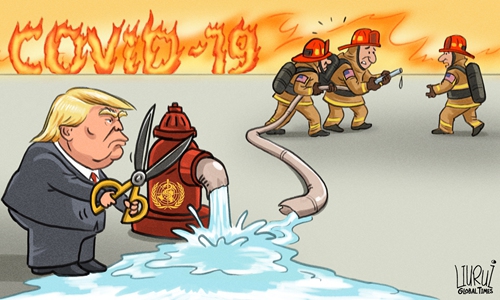https://youtu.be/dSdpvQyGzYw
It's neither moral nor just for the US & the West to refuse to coexist with the Chinese system https://youtu.be/qvjVDedLY-g
It's neither moral nor just for the US & the West to refuse to coexist with the Chinese system https://youtu.be/qvjVDedLY-g
Below is the excerpt of Chinese Foreign Minister Wang Yi’s response during a press conference on Trump’s demand for a US investigation on Wuhan epidemic-related situation.
王外長震怒,對美嚴肅警告,200萬軍隊隨時做好準備?
1、在記者會上,現場有記者問外聯部發言人王毅:美國總統特朗普想向中國派遣自己的調查員,來調查疫情相關情況,如果中國對病毒蔓延負有故意責任,就 需要承擔後果,請問你有何評論?
2、王毅的回答:病毒是全人類的共同敵人,可能在任何時間、任何地方出現,中方同其他國家一樣,受到了新冠病毒的攻擊,是受害者,而不是加害者,更不是病毒的 “同謀”。 當年H1N1流感首先在美國確診並大面積爆發,蔓延到214個國家和地區,導致有將近20萬人死亡,有誰讓美國賠償了嗎? 上世紀80年代,艾滋病首先在美國發現,並迅速蔓延至全世界,給多少人多少家庭造成痛苦,有誰找美國賠償了嗎? 2008年發生在美國的金融動盪,雷曼兄弟公司破產,最終演變為全球金融危機,有誰要求美國賠償了嗎? 美國必須清楚,他們的敵人是病毒,不是中國。
3、王毅接著說:如果特朗普和蓬配奧之流不是犯有老年狂想症,那他們就應該清楚,中國不是任由“八國聯軍”踐踏時的那個中國,中國更不是伊拉克,不是 委內瑞拉,不是敘利亞,不是你想來就來,你想查就查的。 中國不是心虛怕事,而是你不夠資格,你也沒有資格! 我們在疫情初期,就主動邀請世衛組織與中國專家深入疫區進行聯合考察,並就新冠病毒的爆發、傳播等相關問題提出了初步考察結果。 而特朗普提出的調查要求,純屬無理要求,是霸權主義的表現。 他們把美國凌駕於國際組織之上,凌駕於全人類,似乎只有他們自己才是可信的。 但美國果真可信嗎? 伊拉克、委內瑞拉就是前車之鑑。
4、我們要警告特朗普,想打中國的算盤,最好還是想好了再說。 因為14億人民不會答應,中國的200萬軍隊不是擺設,而是中國的鋼鐵長城。 中國的東風導彈也不是用來打耙的,而是用來打狗豺狼的。 中國的核潛艇不是用來在海底旅遊的,而是用來打擊不速之客的。 中國核武器不是用來嚇唬誰的,而是用來自衛的,有誰想嚐嚐滋味兒,想好了你告訴我。
5、我們要警告特朗普,想要中國賠償,那就從八國聯軍侵華時開始算起,一直到王毅剛剛提出的這幾宗一起算。 你先把中國的、世界的歷史舊賬賠償了再說。
6、現在中國在全世界處於非常好的位置,最先控制住了新冠肺炎,最先進入經濟復甦的階段,現在更是加大馬力向全世界出口抗疫物資,中國在經濟總量上趕 超美國的時間也大幅度提前,這是特朗普無法接受的,美國已經被特朗普拖入了泥潭,這個時候特朗普想讓中國、讓全世界都不好過。 害人之心不可有,防特朗普之心絕對不可無,惡人自有天收!
希望每一個中國人都能把這篇文章轉出去,讓我們的中國變得越來越強大,支持所有愛國團體。
Foreign Minister Wang was furious and seriously warned the United States that 2 million troops are ready at any time?
1. At the press conference, a reporter asked Wang Yi, a spokesperson for the outreach ministry: US President Trump wanted to send his own investigator to China to investigate the epidemic-related situation. If China has deliberate responsibility for the spread of the virus, China need to bear the consequences, do you have any comments?
2. Wang Yi’s answer: The virus is the common enemy of all mankind and may appear at any time and anywhere. Like other countries, China has been attacked by the new coronavirus and is the victim, not the perpetrator, nor the virus’s "accomplice". During the time, H1N1 flu was first diagnosed in the United States and broke out in a large area, subsequently, spreading to 214 countries and regions, resulting in the death of nearly 200,000 people, has anyone asked the United States to compensate? In the 1980s, AIDS was first discovered in the United States and quickly spread to the world, causing pain to many people and many families. Has anyone sought compensation from the United States? The financial turmoil that occurred in the United States in 2008, Lehman Brothers went bankrupt, and eventually evolved into a global financial crisis. Has anyone demanded compensation from the United States? The United States must be clear that their enemy is a virus, not China.
3. Wang Yi went on to say: If Trump and Pompeo were not guilty of geriatric madness, then they should be clear that China is no longer the China of yesteryear , to be trampled on by the "eight-nation coalition". Neither is China like Iraq, Venezuela, Syria, where you can come as you please & investigate as you please. Its not that China is afraid, but, rather China feels that US is neither qualified, nor have that right. In the early stage of the epidemic, we took the initiative to invite WHO and Chinese experts to conduct a joint inspection in the epidemic area, and put forward preliminary inspection results on the outbreak and spread of new coronavirus. The investigation request made by Trump is purely unreasonable and is a manifestation of hegemony. They purport the United States as above all international laws and humankind, and that only they can be trusted. But is the United States really that credible? Iraq and Venezuela are lessons to be learnt.
4. We have to warn Trump that if they want to mess around with China, they better think it through. Because 1.4 billion people will not agree, China's 2 million army is not a decoration, but China's Steel Great Wall. China's Dongfeng missiles are not used to rake, but to fight dog jackals. China's nuclear submarines are not used for touring the seabed, but to combat uninvited guests. Chinese nuclear weapons are not used to frighten anyone, but for self-defense. Anyone who wants a taste of it, once you have thought it through clearly, let me know.
5. We want to warn Trump that if US demands compensation from China, US should first account for & compensate back when the Eight-Power Allied Forces invaded China, including all the cases that Wang Yi has just mentioned above added together. US has to first account & compensate China & the rest of the world for those historical cases, before we even begin to talk.
6. Now China is in a very good position in the world, the first to control the new covid virus, the first to enter the stage of economic recovery, and now, its time to accelerate the export of anti-epidemic materials to the world. China is catching up in the Global economy, and the time to overtake the United States is also greatly advanced. It is apparent that this is unacceptable to Trump. The United States has been dragged into the quagmire by Trump. At this time, Trump wants to make China and the rest of the world suffer. Harmfulness to humankind is absolutely wicked and the wicked will have their just dessert.
I hope that every Chinese can turn this article out so that our China becomes stronger and stronger and support all patriotic groups.
Read more:

US hits new low with political strike against Chinese businesses
White House trade advisor Peter Navarro briefed the media on Sunday, asserting that US President Donald Trump will take "strong actions" against TikTok and other Chinese-owned social media apps.Source: Global Times | 2020/7/13 21:14:43
Related Posts:
https://youtu.be/argUC9uFPKA https://youtu.be/nh1j6HH_aro https://youtu.be/SeUiZ6uszlI https://youtu.be/Hm3YJKdblrE
 Ex-colonialists should prepare for China’s counterpunch as their deep-rooted pirate-style against China's Anti-Covid-19 Efforts!
Ex-colonialists should prepare for China’s counterpunch as their deep-rooted pirate-style against China's Anti-Covid-19 Efforts!
Colonialism https://youtu.be/Ha6dehSZn_Y COVID-19: Why do origins matter? https://youtu.be/rwt0KrzCbRQ Trump's gang sel...



























